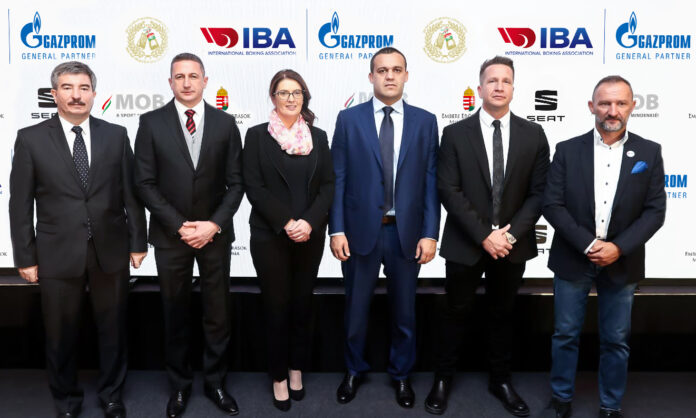Gazprom has a sponsorship deal with AIBA (Photo: AIBA)
The International Olympic Committee (IOC) has raised concerns over the state of the International Boxing Association (AIBA)’s finances, in particular the sponsorship deal the embattled federation reached with Russian state-owned company Gazprom.
In an interim report on AIBA, IOC chief ethics and compliance officer Pâquerette Girard Zappelli questioned the nature of the contract with Gazprom and pointed out that AIBA is in danger of being overly dependent on the Russian company for its revenue.
AIBA’s financial situation was a key factor in the IOC’s decision to suspend it as the Olympic governing body for boxing in June 2019 and in leaving the sport off the initial programme for the 2028 Games in Los Angeles.
The exact terms of the deal between AIBA and Gazprom, which AIBA claims has helped ease its financial crisis, have not been disclosed.
“Due to the non-disclosure of the content of the contract with Gazprom, in particular the global amount paid by Gazprom and AIBA’s performance obligations from the contract, it is not clear what the real nature of this contract could be,” Zappelli wrote.
“This also raises questions about how this contract was negotiated and approved by AIBA.
“Already in 2019, AIBA’s financial dependence on consecutive single sources of revenue from external investors was highlighted and defined as one of the causes of its indebtedness.
“The importance of the Gazprom contract, in proportion to the other revenues, may raise the risk of falling into a similar scheme,” she said.
A report from the EY auditing firm said the contract would run from April 2021 to December 2021, “and that AIBA had received 100 per cent of the contractually stipulated amount of funds in the first half of 2021 as a prepayment”.
EY said the conditions of the Gazprom contract enabled AIBA to “fully cover” its expenditure for the year to June 30, and to cover budgeted expenditures for the year June 30, 2022.
After that period, however, AIBA’s revenues – in addition to the remaining six months of revenues from the Gazprom agreement – will be “dependent on future licensing, sponsorship and event revenues that have yet to be contracted”.
Zappelli highlighted concerns over a conflict of interest and AIBA’s autonomy owing to its dependence on a Russian state-owned company, given that AIBA President Umar Kremlev is also Russian.
Her report also references the outstanding contract dispute between AIBA and First Commitment International Trade (FCIT), one of the causes of the financial problems at the Federation.
FCIT claims AIBA still owes $18.9 million (£14.2 million/€16.7 million), plus interest, related to a loan between FCIT and the now dissolved Boxing Marketing Arm.
The report notes how the “contingent liability related to the FCIT contract…is still open, the claim being contested by AIBA and no settlement having been reached to date”.
AIBA’s ability to operate is “still highly conditional upon adherence to the contractual obligations with Gazprom, to the capacity of AIBA to continue to find other sources of revenues after the Gazprom contract expires and to whether the risk of a potential litigation from FCIT materialises,” Zappelli warned.
AIBA is under pressure to demonstrate it has successfully addresseded the ongoing concerns around its governance, financial transparency and sustainability by 2023, for boxing to be included in Los Angeles 2028 and for its suspension to be lifted in time for Paris 2024.
